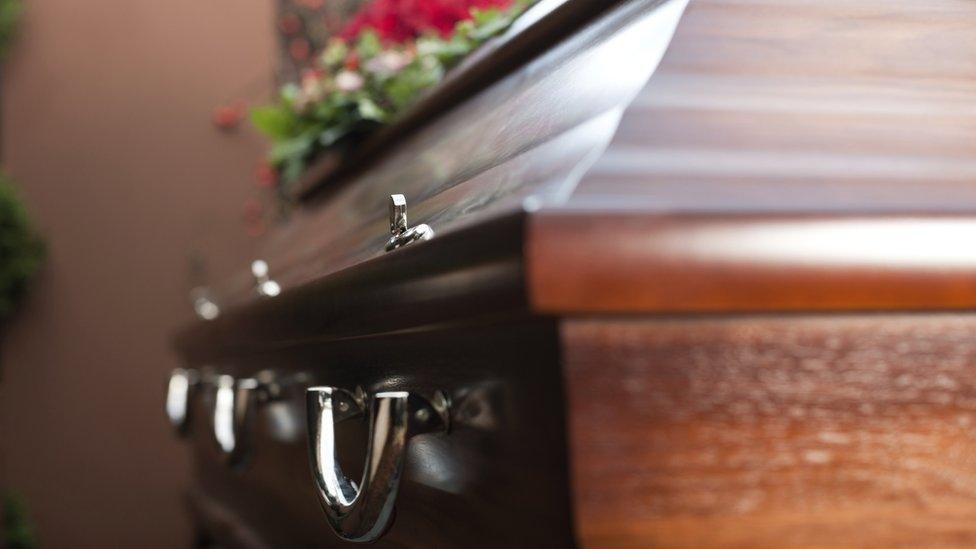'Paupers' funerals' cost councils £1.7m
- Published

The cost to local councils of so-called "paupers' funerals" has risen almost 30% to £1.7m in the past four years.
The number of these funerals has also risen by 11%, a Freedom of Information request by BBC Local Radio revealed.
Public health funerals, as they are known, are carried out by local authorities for people who die alone or without relatives able to pay.
These increases may be due to people living longer and dying alone, and a rise in fees, industry figures said.
The Local Government Association said the "tragic figures speak for themselves".
As part of the research, 436 councils in the UK were asked questions about how many public health funerals they carry out and how much these cost them.
Of the 409 who are responsible for public health funerals, 300 gave full responses.
The results show councils carried out 2,580 public health funerals in 12 months spanning 2013-14, which represents a small fraction of the 500,000 or so people who die in the UK each year.
Overall, north-west England has the greatest number of public health funerals, followed by London.

The biggest increase was in south-east England, where there was a rise of 32% since 2009-10, followed by Scotland, where the number went up by 28% (those figures do not include Glasgow and Edinburgh). It also rose significantly in the West Midlands and Wales.
However, the largest rise in cost was in south-west England - where public health funerals cost councils 63% more now than they did four years ago. Scotland has also seen a sharp rise in cost, while the north-east of England has seen a similarly steep increase.
After some funeral costs were recovered, the cost to councils for those funerals was £1,719,329 - an increase of 28% in the past four years.
The average cost of a funeral now stands at £3,700, according to the Royal London Insurance company - and even a public health funeral with no frills can cost about £1,000.
Anecdotal evidence suggests that with funeral costs going up, families may struggle and are turning to local authorities for support.
Sandra Evans has been assistant director of bereavement services at Cardiff City Council for 20 years.
"When I first came into doing this, we were probably doing five a year and they tended to be vagrants or alcoholics," she said.
Graham Taylor, from Lewisham Council, explains what happens when someone dies without any next of kin
"But over the years it has increased, and sometimes there are families but they are estranged or divorced, or there are families where they claim there's an inability to pay."
People on low incomes can apply for assistance through the Social Fund, which covers the full costs of burial or cremation, and up to £700 in funeral directors' fees.
They can be put off by the complexity of that process, though, and there is no guarantee that an application will succeed.
Even if it did succeed, Ms Evans said, the £700 funding amount had not changed for a decade - while funeral costs had gone up by more than inflation.
Councillor Izzi Seccombe, of the LGA's community wellbeing board, said: "It is a sad fact that there are thousands of people across the country with no family or friends to arrange, attend or pay for their funeral. Nobody should find themselves in that position."
Public health funerals were a last resort and many people on low incomes were entitled to a social fund funeral, she said.

'It's always quite sad'
Sandra Evans has been searching the home of Sandra Horner, a former head teacher who was 67 when she died. It is discovered she was divorced and had no children.
"It's always quite sad. You see how a person lived, and you come across letters and photographs... a little insight into what their life was like," says Ms Evans.
With no close family still alive, it is the council that will have to arrange and pay for Sandra Horner's cremation. Ms Evans says public health funerals used to be a last resort - used mainly for the homeless - but they are becoming more common.
Sandra Horner was cremated at a simple service attended by about 12 of her friends.

Tim Morris, chief executive of the Institute of Cemetery and Crematoria Management, said the funeral industry needed more regulation and the government needed to simplify applications for the Social Fund.
"I think more people are being trapped in funeral poverty - that is, they just can't afford funerals," he said.
'Third-party costs'
This is something Mark Woollard, from the National Society of Allied and Independent Funeral Directors, rejects.
"I think there's been an increase in public health funerals because people don't have as much disposable income, and also, people are living longer and alone," he said.
"A lot of [the cost] is due to third-party costs such as crematorium fees, cemetery fees, and the minster's fees - [which] have gone up much more than the funeral directors' costs."
For the most part, those who do have a paupers' funeral are buried or cremated with no gravestone or lasting physical memorial - just an unmarked grave.
That is something many families will continue to strive to avoid for their loved ones, even if it may mean getting into debt.
Correction 25 February 2016: Some of the percentages in this report have been amended as incorrect calculations produced lower figures.